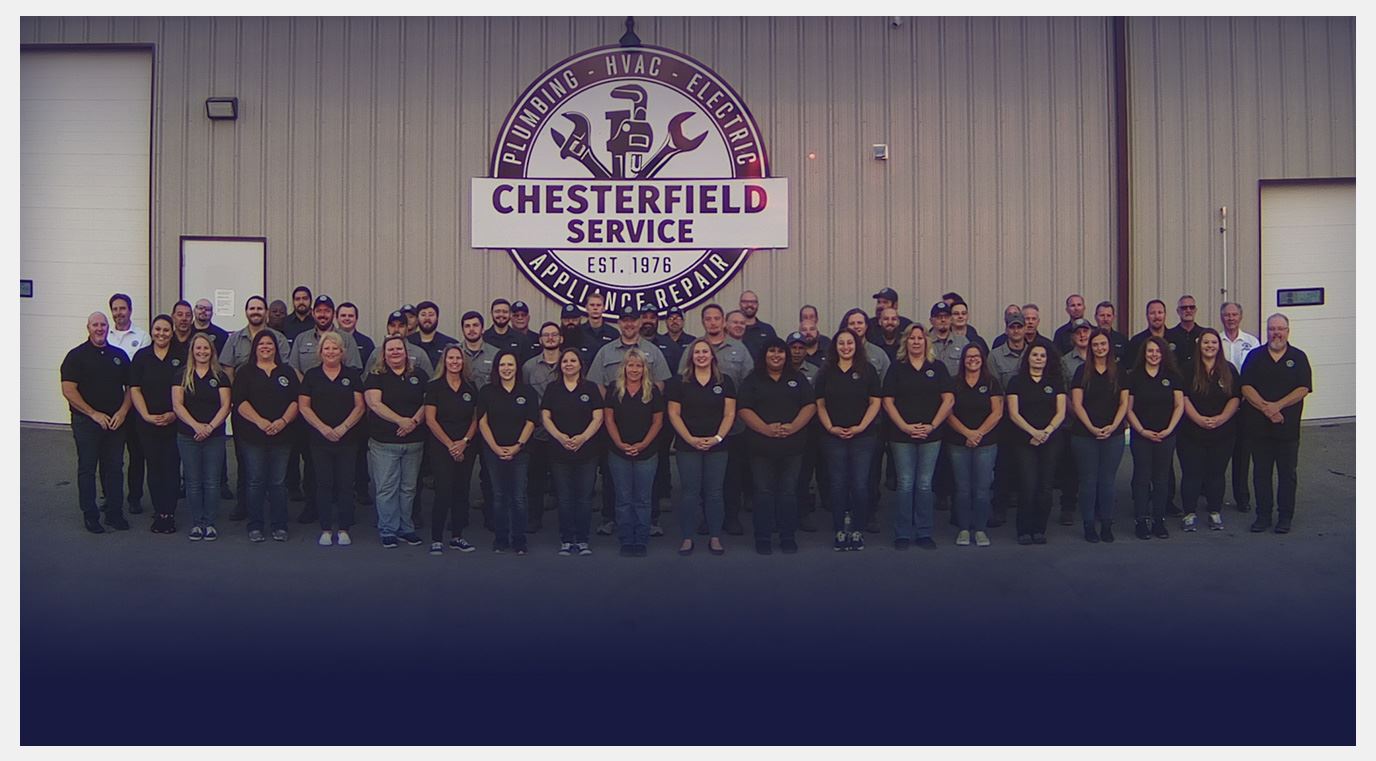
Washer and Dryer Repair in Chesterfield, Missouri
Fixing Malfunctioning Laundry Equipment in St. Louis County and Beyond
It doesn’t take long for laundry to pile up when your washing machine or dryer breaks down. Chesterfield Service understands that there’s nothing more inconvenient than being unable to wash or dry your clothes quickly. We provide the best appliance repair, heating, cooling, plumbing, and indoor air quality (IAQ) services here in Chesterfield, St Louis, and beyond.
We’re familiar with how a wide range of units and brands operate, and we have the tools, equipment, and expertise to repair just about any washer and dryer, from LG and Samsung to Maytag and Whirlpool. If it’s manufactured or sold in the United States, we’ve seen it, inspected it, and repaired it. Let us repair yours, too!
Request a washer or dryer repair estimate from Chesterfield Service today by calling our Chesterfield office at (636) 837-1949!
Signs You Need Washer or Dryer Repairs
Not all washers and dryers suddenly stop working all at once. Sometimes, there are subtle warning signs that you can recognize and proactively address.
Call our team if you’ve noticed:
- Strange noises: Bumps, bangs, screeches, and squeals can indicate a wide range of problems. Don’t let a component failure get worse by continuing to run the machine.
- The drum isn’t filling: The washing drum should fill immediately. If it doesn’t, you may have a blocked or leaking hose or another problem requiring repair.
- The drum isn’t spinning: When the drum in the washing machine doesn’t rotate, it could indicate a problem with either the belt or lid sensor.
- Water won’t drain: If the drum won’t drain, it’s often because the drain or hose is blocked. If you try to wash your clothes anyway, you risk them not getting properly cleaned and taking much longer to dry.
- Overheating: An overheated dryer requires immediate service. Dryers can become blocked when the vents get clogged with dryer lint, which can start a fire.
- The dryer drum won’t turn: This can occur when the belt breaks or if the tension is insufficient to rotate the drum. Either way, it warrants a repair.
- No heat: When the heating element fails, you won’t get adequate heating to dry your clothes. You will either have to run continuous drying cycles or take your clothes out wet to dry.
- Incorrect cycling: If the washer or dryer stops mid-cycle, there could be an electrical issue. The machine’s sensors halt the unit's operation to prevent overheating.
- Leaks: Water leaks often indicate blocked hoses or loose connections and should be dealt with ASAP to avoid water damage.
No matter what strange behaviors you notice in your washer or dryer, our experts have the knowledge and experience to correct the problem.


How to Prevent Washer and Dryer Breakdowns
Make it a habit to clean your lint trap and dryer vent regularly. Accumulated lint can restrict airflow, causing your dryer to overheat and potentially leading to a fire hazard. Also, check that your washing machine's detergent drawer and rubber door seal are residue-free and mold-free. This helps prevent unpleasant odors and keeps your washer functioning effectively.
It's also crucial to ensure that your appliances are balanced and on a stable surface. An unbalanced washer can vibrate excessively, leading to premature wear and tear on components. Use a level to ensure your machines are properly aligned and adjust the feet as needed. Furthermore, avoid overloading your washer and dryer, as this can strain the motor and other parts. Following the manufacturer's recommended load sizes can go a long way in prolonging the life of your appliances.
What to Do When Your Washing Machine is Leaking Water
If you find your washing machine leaking water, it's important to act quickly to minimize damage and inconvenience.
Take steps like:
- Turning off the machine: Immediately cease operation and unplug your washing machine. This prevents any further water leakage and protects you while you inspect the issue.
- Checking the water supply hose: Inspect the hoses connecting your washer to the water supply. Look for cracks, loose fittings, or holes. Tighten any loose connections and replace damaged hoses if necessary.
- Inspecting the door seal: Examine the rubber seal around the washing machine door for signs of wear or damage. A cracked or worn seal can cause leaks. Clean the seal and remove any debris that might obstruct its proper function. Replace the seal if necessary.
- Examining the drain hose and pump: Run a hand along the drain hose to look for leaks, kinks, or blockages. Make sure that it's properly connected to both the pump and the wall outlet. If the pump itself shows signs of malfunction, it may need to be replaced or repaired.
- Leveling the machine: Check that your washing machine is balanced. An unlevel machine can vibrate excessively, potentially causing leaks. Adjust the machine's feet until they are stable and level.

Trusted in our industry
-
"Kyle did an excellent job."
He was very professional throughout. Well done!!
Jeff H. -
"Scott was professional and courteous."
I am very satisfied with Scott and this company.
Ann D. -
"I would highly recommend Chesterfield Service for appliance repair."
Service was great.
Linda R. -
"I would highly recommend Ray and Chesterfield Service!"
Ray F. was very friendly, knowledgeable and professional.
Christine H. -
"Would definitely use him again for service!"
He was honest and didn’t try to upsell.
Kelly C. -
"Chesterfield Service is worthy of our five stars rating."
Chesterfield Services never disappoints.
Abdalla E. -
"Great company to work with as well."
I was impressed with Ben’s work ethic and attention to detail.
Matthew M. -
"Very highly recommend."
Every technician has been knowledgeable, professional, and most importantly honest.
Kris R.





